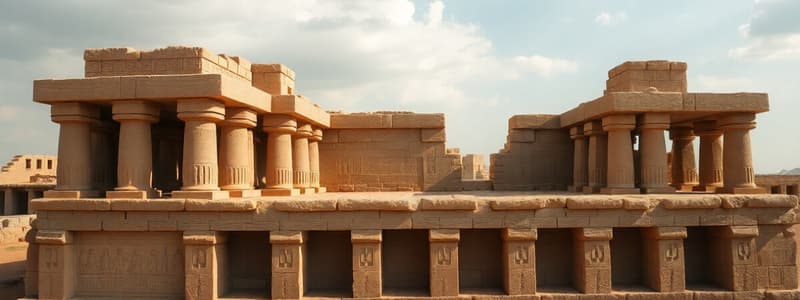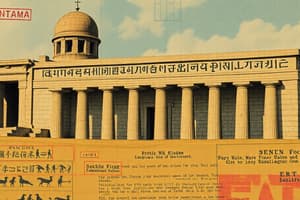Podcast
Questions and Answers
Which city-state was the domain of Nanna?
Which city-state was the domain of Nanna?
- Lagash
- Nippur
- Ur (correct)
- Uruk
Cuneiform writing was primarily used for literary purposes in Early Dynastic Mesopotamia.
Cuneiform writing was primarily used for literary purposes in Early Dynastic Mesopotamia.
False (B)
What was the primary function of ziggurats in Sumerian civilization?
What was the primary function of ziggurats in Sumerian civilization?
To serve as temples dedicated to the patron deities.
Ningirsu, the god of the plow, was the patron of ______.
Ningirsu, the god of the plow, was the patron of ______.
Match the following gods with their associated city-state:
Match the following gods with their associated city-state:
What was a common reason for warfare among the Sumerian city-states?
What was a common reason for warfare among the Sumerian city-states?
Warfare in Early Dynastic Mesopotamia was primarily conducted by wealthy elites.
Warfare in Early Dynastic Mesopotamia was primarily conducted by wealthy elites.
What social structure characterized the Sumerian civilization?
What social structure characterized the Sumerian civilization?
What was the term used for households in the oikoi economy?
What was the term used for households in the oikoi economy?
Women in the Early Dynastic period primarily engaged in agricultural labor.
Women in the Early Dynastic period primarily engaged in agricultural labor.
List two types of workers included in the social stratification of the oikoi economy.
List two types of workers included in the social stratification of the oikoi economy.
Men primarily performed _____ labor in the agricultural fields during the Early Dynastic period.
Men primarily performed _____ labor in the agricultural fields during the Early Dynastic period.
Match the following roles with their associated responsibilities in Mesopotamian society:
Match the following roles with their associated responsibilities in Mesopotamian society:
Which of the following accurately describes the treatment of captured males versus females during war?
Which of the following accurately describes the treatment of captured males versus females during war?
Social inequalities in the oikoi economy increased rapidly due to the enslavement of debtors and war captives.
Social inequalities in the oikoi economy increased rapidly due to the enslavement of debtors and war captives.
What does the term 'superfamily' refer to in the context of the oikoi economy?
What does the term 'superfamily' refer to in the context of the oikoi economy?
What does Hammurabi's code reveal about his cultural context?
What does Hammurabi's code reveal about his cultural context?
Hammurabi's code contains elements that are entirely foreign to today's legal systems.
Hammurabi's code contains elements that are entirely foreign to today's legal systems.
Name one aspect of Hammurabi's code that has persisted into our present legal system.
Name one aspect of Hammurabi's code that has persisted into our present legal system.
Hammurabi's code was primarily concerned with __________ issues.
Hammurabi's code was primarily concerned with __________ issues.
Match the following aspects of Hammurabi's code with their relevance:
Match the following aspects of Hammurabi's code with their relevance:
What was the primary purpose of the earliest writing in Mesopotamia?
What was the primary purpose of the earliest writing in Mesopotamia?
Cuneiform writing was accessible to the general public.
Cuneiform writing was accessible to the general public.
What are bullae and how were they used in early writing?
What are bullae and how were they used in early writing?
Cuneiform writing was primarily used for _______ transactions.
Cuneiform writing was primarily used for _______ transactions.
Match the following terms with their descriptions:
Match the following terms with their descriptions:
Who primarily had the ability to read and write in cuneiform?
Who primarily had the ability to read and write in cuneiform?
Writing in Mesopotamia included both seals and numerical tablets.
Writing in Mesopotamia included both seals and numerical tablets.
Identify the writing system that emerged in Mesopotamia.
Identify the writing system that emerged in Mesopotamia.
What is one of the key points outlined in the Code of Hammurabi regarding slaves?
What is one of the key points outlined in the Code of Hammurabi regarding slaves?
The Code of Hammurabi is considered one of the first written legal codes.
The Code of Hammurabi is considered one of the first written legal codes.
What is the term used to describe the set of laws established by Hammurabi?
What is the term used to describe the set of laws established by Hammurabi?
The Code of Hammurabi includes laws that address social issues and ______.
The Code of Hammurabi includes laws that address social issues and ______.
According to the Code of Hammurabi, what happens if a master is unable to see their slave?
According to the Code of Hammurabi, what happens if a master is unable to see their slave?
Match the term to its description related to the Code of Hammurabi:
Match the term to its description related to the Code of Hammurabi:
The Code of Hammurabi allowed for different punishments based on social status.
The Code of Hammurabi allowed for different punishments based on social status.
The Code of Hammurabi was inscribed on a ______ stone.
The Code of Hammurabi was inscribed on a ______ stone.
Flashcards
Sumerian Civilization
Sumerian Civilization
A collection of independent city-states in southern Mesopotamia, sharing common features like cuneiform writing and a pantheon of gods.
Cuneiform Writing
Cuneiform Writing
The earliest writing system in Mesopotamia, used for recording economic transactions.
Patron Deity
Patron Deity
A god or goddess associated with a specific city-state in Early Dynastic Mesopotamia.
Ziggurats
Ziggurats
Signup and view all the flashcards
Mesopotamian Warfare
Mesopotamian Warfare
Signup and view all the flashcards
Social Hierarchies
Social Hierarchies
Signup and view all the flashcards
Economic Transactions
Economic Transactions
Signup and view all the flashcards
City-States
City-States
Signup and view all the flashcards
Record Keeping
Record Keeping
Signup and view all the flashcards
Scribe
Scribe
Signup and view all the flashcards
Restricted Occupation
Restricted Occupation
Signup and view all the flashcards
Royal Inscriptions
Royal Inscriptions
Signup and view all the flashcards
Numerical Tablets
Numerical Tablets
Signup and view all the flashcards
Ritual Hymns
Ritual Hymns
Signup and view all the flashcards
Hammurabi's Code
Hammurabi's Code
Signup and view all the flashcards
Cultural Context
Cultural Context
Signup and view all the flashcards
Day-to-Day Concerns
Day-to-Day Concerns
Signup and view all the flashcards
Familiar Elements
Familiar Elements
Signup and view all the flashcards
Legal System
Legal System
Signup and view all the flashcards
Oikoi Economy
Oikoi Economy
Signup and view all the flashcards
Superfamilies
Superfamilies
Signup and view all the flashcards
Social Stratification
Social Stratification
Signup and view all the flashcards
Gendered Roles
Gendered Roles
Signup and view all the flashcards
Slavery in Mesopotamia
Slavery in Mesopotamia
Signup and view all the flashcards
Cuneiform Tablets
Cuneiform Tablets
Signup and view all the flashcards
Archaeological Evidence
Archaeological Evidence
Signup and view all the flashcards
Code of Hammurabi
Code of Hammurabi
Signup and view all the flashcards
Eye for an Eye
Eye for an Eye
Signup and view all the flashcards
Social Hierarchy in Hammurabi's Code
Social Hierarchy in Hammurabi's Code
Signup and view all the flashcards
Slavery in Hammurabi's Code
Slavery in Hammurabi's Code
Signup and view all the flashcards
Punishments for Crimes
Punishments for Crimes
Signup and view all the flashcards
The Importance of Hammurabi's Code
The Importance of Hammurabi's Code
Signup and view all the flashcards
How was Hammurabi's Code Enforced?
How was Hammurabi's Code Enforced?
Signup and view all the flashcards
The Legacy of Hammurabi's Code
The Legacy of Hammurabi's Code
Signup and view all the flashcards
Study Notes
Ancient Mesopotamia
- City-states in southern Mesopotamia were often called "Sumerian civilization," though each city-state operated independently.
- They shared common traits like cuneiform writing, a shared pantheon of gods and goddesses, ziggurats, metalworking, complex social hierarchies with distinct classes and status differences between elites and commoners, and craft specialists.
Economic Transactions
- Early Mesopotamian writing developed as a method for recording economic transactions.
- Seals, sealings, counters, bullae, and numerical tablets are early forms of financial records.
Religion and Ritual
- Each Early Dynastic city had a patron deity, and temples were dedicated to them.
- The city-state of Ur was ruled by Nanna (the moon goddess).
- Ningirsu was the patron deity of Lagash.
- Anu and Inanna were associated with Uruk.
- Enlil was associated with Nippur.
Warfare and Violence
- City-states frequently fought over resources like agricultural land, water rights, and trade routes.
- Power was spread among numerous city-states, with no single city dominating for long periods.
- Warfare led to the capture of slaves, used as a form of labor in cities.
- Soldiers during this time fought in phalanxes, equipped with shields, spears, axes, chariots, maces, and daggers.
Written Word
- Protocuneiform, an ideographic writing system, was used in Uruk and Jemdet Nasr periods.
- Cuneiform continued as the writing system during the Early Dynastic period (ED).
- Writing was primarily used for bookkeeping, but also for recording myths, royal inscriptions, recipe lists, and ritual hymns.
Written Word: Further Detail
- Early Mesopotamian writing primarily focused on recording economic transactions
- This writing included seals, sealings, counters, bullae, and numerical tablets.
Written Word: Scribes
- Writing was restricted to a specific occupational class called scribes.
- They controlled the language.
- Even kings, priests, and priestesses were generally unable to read or write.
Oikos Economy
- "Superfamilies" combined kin-based households with non-kin laborers.
- Lower-ranking or indebted individuals frequently worked for elite landowners, temples, and palaces.
- Each superhousehold operates as an oikos.
- This system often involved debt slavery and war captives, significantly increasing social inequality.
Social Life
- Cuneiform tablets detailed ranked and gendered lists of professionals.
- Oikoi extended these rankings to include contracted workers, slaves, rulers, religious and military elites, scribes, overseers, bureaucrats, merchants, traders, and commoners.
- Social hierarchy was reflected in archaeological burials.
Roles of Men and Women
- Divisions of labor in Early Dynastic Mesopotamia were, in many cases, gender-based.
- Men often engaged in agricultural labor, military service, and animal husbandry.
- Women's roles involved crafting textiles, mats, working in orchards, and caring for pigs.
- War captives, regardless of gender, often became slaves in the temples or palaces.
Hammurabi's Code
- Hammurabi's Law Code (1755-1750 BCE) is a Babylonian legal text, significant in human history.
- It reflects the day-to-day concerns of the culture of that time, including aspects of law that are still relevant today.
- The code reveals a cultural context quite different from our own modern world.
- The study of the code contains aspects that persisted or were similar to present-day legal systems.
Hammurabi's Code: Activity
- Students should analyze the text of the code of Hammurabi and discover aspects of the law that are relevant today and aspects that are not.
- Explain why aspects are still applicable and why certain portions are not relevant or applicable.
- Discuss the surprises or insights that archaeological studies can provide on societies of the past.
Studying That Suits You
Use AI to generate personalized quizzes and flashcards to suit your learning preferences.




